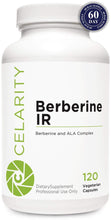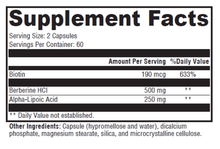-
 physician-grade products
physician-grade products -
 based on latest research
based on latest research -
 clinically-relevant dosing
clinically-relevant dosing -
 purity-tested ingredients
purity-tested ingredients
IMPROVE INSULIN SENSITIVITY AND LOWER BLOOD SUGAR NATURALLY
A compound called Berberine is one of the most effective natural supplements available. Berberine has been shown to lower blood sugar, cause weight loss, and improve heart health. One of the main actions of Berberine is to activate the AMPK enzyme, which is sometimes referred to as the "metabolic master switch".
Many studies show that berberine can significantly reduce blood sugar levels in individuals with type 2 diabetes. In fact, its effectiveness is comparable to the popular diabetes drug metformin.
If you want to improve your insulin sensitivity, lower blood sugar naturally, and maintain a healthy body weight, then look to the nutrient berberine. Berberine IR by Celarity is a natural insulin sensitivity supplement designed to help your body regulate insulin levels and balance your blood sugar naturally.
Berberine IR is designed to help support cardiometabolic health. It delivers alpha-lipoic acid (ALA), the plant alkaloid berberine, and biotin in one convenient formula. These ingredients have been observed to support insulin activity and glucose metabolism. Research also suggests a role for berberine in supporting normal A1C levels. We recommend that you combine Berberine IR with a low carb diet (like the Heal Yourself Diet) for optimal results.
- Supports Glucose Metabolism and Insulin Sensitivity
- Supports Healthy Blood Lipid Metabolism
- Assists the Body in Maintaining Normal Levels of HbA1c
- Positively Influences Adipocyte Differentiation and PPAR Expression Associated with Adipogenesis
- Provides Antioxidant Support
- Decreases Insulin Resistance, making the blood sugar lowering hormone insulin more effective.
- Increases Glycolysis, helping the body break down sugars inside cells.
- Decrease Sugar Production in the liver.
- Slows the Breakdown of Carbohydrates in the Gut.
- Increases the Number of Beneficial Bacteria in the Gut.
BERBERINE
Berberine is known as an alkaloid, and plants containing berberine have traditionally been used for their various health-promoting properties. Research has demonstrated that berberine helps regulate glucose and lipid metabolism, positively influences cell signaling, provides antioxidant support, and impacts immune health.[1-3] Of more recent interest is the influence of berberine on cardiometabolic health, including its effects on adenosine monophosphate-activated protein kinase (AMPK), gene transcription and signaling factors that influence adipose tissue differentiation, and hemoglobin A1c (HbA1c) levels.
Adenosine Monophosphate-Activated Protein Kinase (AMPK)
As the primary enzyme that induces an intracellular cascade of events, AMPK is responsible for maintaining and replenishing cellular energy stores. AMPK activation stimulates glucose uptake and fat oxidation while it suppresses lipogenesis and gluconeogenesis. Cumulatively, AMPK activation leads to beneficial metabolic states in liver, muscle, and peripheral tissues. Of the natural products known to activate AMPK, berberine is one of the most prominent. AMPK activation by berberine was reported as early as 2006.[4] Since that time, berberine-mediated AMPK activation has been repeatedly demonstrated, and this mechanism is thought to be central to the beneficial effects on glucose metabolism, insulin sensitivity, cytokine activity, and cardiovascular health observed in patients taking berberine.[3,5,6]
Adipocyte Differentiation and PPAR-Gamma Expression
In vitro, berberine positively influences fat cell size.[7] This effect is significant because it has been reported that fat tissue composed of a high number of small fat cells is more sensitive to insulin than fat tissue (with the same lipid content) composed of a low number of large fat cells. Berberine has also been shown to downregulate the adipogenesis-regulating transcription factors peroxisome proliferator-activated receptor (PPAR) gamma2 and CCAAT/enhancer-binding protein (C/EBP) alpha in preadipocytes isolated from human omental fat.[7] This downregulating effect on PPARs has been observed in other in vitro work and in animal research as well.[8-11] In a human study, individuals taking 900 mg/d of berberine for three months showed decreases in waist circumferences and BMI (body mass index) as well as significant decreases in leptin levels, leptin/adiponectin ratio, and the homeostatic model assessment of insulin resistance (HOMA-IR). There were no significant changes in adiponectin levels.[7]
Hemoglobin A1c (HbA1c)
Also known as glycated hemoglobin or glycosylated hemoglobin, HbA1c serves as the definitive measure of a person’s average blood sugar level for a three-month period. Maintaining HbA1c within a healthy range is an important aspect of cardiometabolic wellness. Recent studies on berberine show that doses of 1,000 to 3,000 mg/d have a positive effect on HbA1c levels. Yin et al demonstrated that 1,500 mg/d of berberine had significant beneficial effects on HbA1c, glucose metabolism, and triglyceride metabolism.[1] In a randomized placebo-controlled study (n = 116), 1,000 mg/d of berberine significantly decreased HbA1c and had positive effects on blood lipid metabolism.[2] This desirable effect on HbA1c by berberine has also been observed in animals.[8]
Taken together, these research studies suggest that berberine has excellent potential as an agent that supports cardiometabolic health. Four capsules or one daily dose of Berberine IR provides 1,000 mg of berberine hydrochloride to achieve the range (1,000 to 1,500 mg/d) used in clinical studies.
ALPHA-LIPOIC ACID (ALA)
ALA is a multifunctional antioxidant also known as thiotic acid. It has numerous effects that complement berberine. These effects include reducing oxidative stress, regenerating antioxidants, increasing glutathione synthesis, boosting antioxidant defense systems at the gene-expression level, stimulating AMPK activation,[12,13] affecting adipocyte differentiation,[13] and increasing insulin-stimulated glucose disposal.[12,14,15] Furthermore, ALA inhibits nuclear factor-κB (Nf-κB), a transcription factor that activates many proinflammatory genes in the vasculature, making ALA an excellent pairing to berberine for cardiometabolic health.
BIOTIN
Biotin has been added because chronic administration of lipoic acid lowers the activities of pyruvate carboxylase and beta-methylcrotonyl- CoA carboxylase in vivo by competing with biotin.
Count: 120 capsules
Recommended Usage: Take two capsules daily, or as directed by your healthcare practitioner.
Cautions: Consult your healthcare practitioner prior to use. Individuals taking medications, especially medications that are metabolized by cytochrome P450 enzymes or that affect blood glucose, should discuss potential interactions with their healthcare practitioner. Do not use if you are pregnant, nursing, or trying to conceive. Do not use if tamper seal is damaged.
Does Not Contain: Wheat, gluten, yeast, soy, animal or dairy products, fish, shellfish, peanuts, tree nuts, egg, ingredients derived from genetically modified organisms (GMOs), artificial colors, artificial sweeteners, or artificial preservatives.
References:
1. Yin J, Xing H, Ye J. Efficacy of berberine in patients with type 2 diabetes mellitus. Metabolism. 2008 May;57(5):712-17. [PMID: 18442638]
2. Zhang Y, Li X, Zou D, et al. Treatment of type 2 diabetes and dyslipidemia with the natural plant alkaloid berberine. J Clin Endocrinol Metab. 2008 Jul;93(7):2559-65. [PMID: 18397984]
3. Li Z, Geng YN, Jiang JD, et al. Antioxidant and anti-inflammatory activities of berberine in the treatment of diabetes mellitus. Evid Based Complement Alternat Med. 2014;2014:289264. [PMID: 24669227]
4. Lee YS, Kim WS, Kim KH, et al. Berberine, a natural plant product, activates AMP-activated protein kinase with beneficial metabolic effects in diabetic and insulin-resistant states. Diabetes. 2006 Aug;55(8):2256-64. [PMID: 16873688]
5. Wang Q, Zhang M, Liang B, et al. Activation of AMP-activated protein kinase is required for berberine-induced reduction of atherosclerosis in mice: the role of uncoupling protein 2. PLoS One. 2011;6(9):e25436. Epub 2011 Sep 27. [PMID: 21980456]
6. Zhang M, Wang CM, Li J, et al. Berberine protects against palmitate-induced endothelial dysfunction: involvements of upregulation of AMPK and eNOS and downregulation of NOX4. Mediators Inflamm. 2013;2013:260464. [PMID: 24385682]
7. Yang J, Yin J, Gao H, et al. Berberine improves insulin sensitivity by inhibiting fat store and adjusting adipokines profile in human preadipocytes and metabolic syndrome patients. Evid Based Complement Alternat Med. 2012;2012:363845. [PMID: 22474499]
8. Zhou J, Zhou S. Berberine regulates peroxisome proliferator-activated receptors and positive transcription elongation factor b expression in diabetic adipocytes. Eur J Pharmacol. 2010 Dec 15;649(1-3):390-97. [PMID: 20868663]
9. Zhou LB, Chen MD, Wang X, et al. Effect of berberine on the differentiation of adipocyte [in Chinese]. Zhonghua Yi Xue Za Zhi. 2003 Feb 25;83(4):338-40. [PMID: 12812656]
10. Liu Y, Lou SY, He YM. Effects of berberine on cell proliferation, peroxisome proliferation activated receptor gamma, CAAT/enhancer binding protein mRNA and protein expression in 3T3-L1 pre-adipocytes [in Chinese]. Zhongguo Zhong Xi Yi Jie He Za Zhi. 2008 Nov;28(11):1005-09. [PMID: 19213344]
11. Li GS, Liu XH, Zhu H, et al. Berberine-improved visceral white adipose tissue insulin resistance associated with altered sterol regulatory element-binding proteins, liver x receptors, and peroxisome proliferator-activated receptors transcriptional programs in diabetic hamsters. Biol Pharm Bull. 2011;34(5):644-54. [PMID: 21532151]
12. Golbidi S, Badran M, Laher I. Diabetes and alpha lipoic acid. Front Pharmacol. 2011;2:69. [PMID: 22125537]
13. Hahm JR, Noh HS, Ha JH, et al. Alpha-lipoic acid attenuates adipocyte differentiation and lipid accumulation in 3T3-L1 cells via AMPK-dependent autophagy. Life Sci. 2014 Apr 1;100(2):125-32. Epub 2014 Feb 14. [PMID: 24530288]
14. Diesel B, Kulhanek-Heinze S, Höltje M, et al. Alpha-lipoic acid as a directly binding activator of the insulin receptor: protection from hepatocyte apoptosis. Biochemistry. 2007 Feb 27;46(8):2146-55. [PMID: 17274632]
15. Konrad D, Somwar R, Sweeney G, et al. The antihyperglycemic drug alpha-lipoic acid stimulates glucose uptake via both GLUT4 translocation and GLUT4 activation: potential role of p38 mitogen-activated protein kinase in GLUT4 activation. Diabetes. 2001 Jun;50(6):1464-71. [PMID: 11375349]
16. Zempleni J, Trusty TA, Mock DM. Lipoic acid reduces the activities of biotin-dependent carboxylases in rat liver. J Nutr. 1997 Sep;127(9):1776-81. [PMID: 9278559]
17. http://diabetes.diabetesjournals.org/content/55/8/2256.full
18. https://www.ncbi.nlm.nih.gov/pubmed/10409121
19. https://www.ncbi.nlm.nih.gov/pubmed/25607236
20. https://www.ncbi.nlm.nih.gov/pubmed/25498346
21. https://www.ncbi.nlm.nih.gov/pubmed/18442638
22. https://www.ncbi.nlm.nih.gov/pubmed/25861268
Disclaimer: These statements have not been evaluated by the Food and Drug Administration. This product is not intended to diagnose, treat, cure or prevent any disease.




